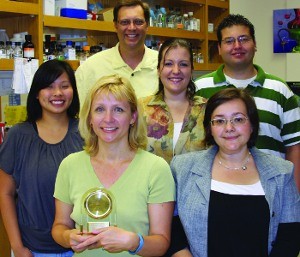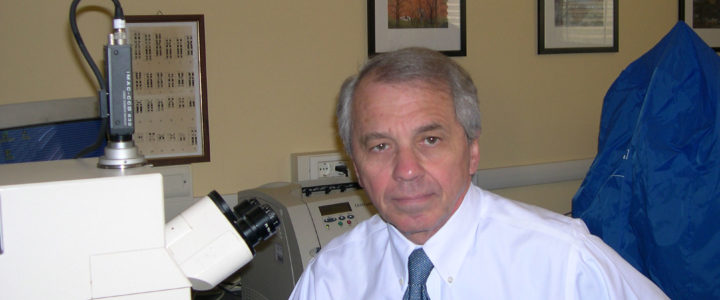With a $50,000 grant from FRAXA Research Foundation, Dr. Giovanni Neri and his team at Universita Cattolica del S. Cuore screened compounds with Neuropharm (UK) for reactivating compounds. This team is collaborating with Dr. Stephen Haggarty at Harvard and MIT (who also has a FRAXA grant), researching reactivation of the FMR1 gene and characterization of cell lines with unmethylated full mutations. Results published.
Read moreResearch
Small Molecule Screen Using Fragile X Neural Stem Cells

With a $90,000 grant from FRAXA Research Foundation, Dr. Peng Jin’s team from Emory University School of Medicine found that Fragile X causes an increase production of new cells, so they tested large numbers of drugs to find those that can correct this. This high throughput drug screen uses neural stem cells from Fragile X knockout mice to identify small molecules which may be therapeutic in Fragile X.
Read moreNeuromotor Outcome Measures for Clinical Trials in Fragile X Syndrome

With a $35,000 grant from FRAXA Research Foundation, Dr. Nicole Tartaglia from the University of Colorado Denver and Tracey Stackhouse aimed to develop neuromotor outcome measures for use in clinical trials in FXS, and to contribute to a deeper understanding of the neuromotor issues involved in FXS. This collaborative project was completed at the two sites of the Colorado Fragile X Clinic: The Children’s Hospital and Developmental FX. Dr. Nicole Tartaglia is the Medical Director of the Fragile X Clinic at The Children’s Hospital of Denver. Tracy Murnan Stackhouse, MA, OTR is the co-founder of the Developmental & Fragile X Resource Centre (Developmental FX), a clinic specializing in Fragile X.
Read moreThe Role of FMRP and Small, Non-Coding RNAs in Translation

With a $120,000 grant from FRAXA Research Foundation, Drs. Henri Tiedge and Jun Zhong studied the mechanisms by which local protein translation is repressed. Multiple parallel mechanisms keep protein synthesis in check; one of them involves FMRP, and a similar mechanism involves the non-coding RNA, BC1. Results published.
Read moreSmall Molecule Modulators of Lithium for Treatment of Fragile X Syndrome

With a $219,500 grant from FRAXA Research Foundation, Dr. Stephen Haggarty from Havard/MIT developed a high-throughput drug screen to find compounds that inhibit GSK3, a critical enzyme in Fragile X. He looked for compounds that can accomplish this either alone or in combination with lithium, offering the possibility of enhancing the effectiveness of lithium as a treatment. His drug screen used patient-specific neural progenitor (NP) cells derived from human induced pluripotent stem cells (iPSCs) – which are created from cells in a skin biopsy from people with Fragile X syndrome (FXS) and other autism spectrum disorders.
Read moreAberrant Behavior Checklist in Fragile X Syndrome

With a $10,000 grant from FRAXA Research Foundation, Dr. Hessl at the University of California at Davis led a collaborative study to analyze the Aberrant Behavior Checklist (ABC) as an outcome measure for children and adults with Fragile X syndrome. Results published.
Read moreRole of the Cerebellum in the Dysfunction of Fragile X Syndrome

Correcting Fragile X Syndrome Deficits by Targeting Neonatal PKCε Signaling in the Brain Ben A. Oostra, PhD Principal Investigator Erasmus University Rotterdam, The Netherlands 2004-2005 Grant Funding: $119,000 Summary The Dutch-Belgian Fragile X Consortium led by Dr. Oostra created the
Read moreDeveloping Fragile X Treatments in Fruit Flies and Mice

With a $380,000 grant from FRAXA Research Foundation from 2005-2009, Drs. Sean McBride, Tom Jogens, and Catherine Choi studied one of the most important aspects of FRAXA’s research; the preclinical validation of potential therapeutic strategies. Many labs have found new leads for treatment. However, very few have the capacity to test new drugs in the mouse model to establish efficacy rigorously enough to lead to clinical trials. The McBride lab (in a broad collaboration with the Choi, Jongens, and Skoulakis groups) aims to do just that. Results published.
Read moreImaging Synaptic Structure and Function in Fragile X Mice

FRAXA Research Foundation grants $150,000 over 2005-2009 to Dr. Carlos Portera-Cailliau to study intact, anesthetized Fragile X mouse brains, looking for defects in the density, length, or dynamics of the dendrites. They looked for changes in the neurons after treatment with mGluR5 antagonists.
Read moreGenome-wide Epigenetic Markers in Fragile X

With $45,000 in grants from FRAXA Research Foundation over several years, Dr. Miklos Toth of Cornell University studied epigenetics (ie factors other than the gene itself) which can determine symptom severity in Fragile X.
Read moreRole of Matrix Metalloproteinases (MMP-9) in Fragile X

With a $220,000 grant from FRAXA Research Foundation over 3 years, Dr. Iryna Ethell from the University of California at Riverside studied the regulation of dendritic structure by matrix metalloproteinases and other extracellular signaling pathways. This work identified a major treatment strategy for Fragile X with the available MMP-9 inhibitor, minocycline.
Read moreNovel Functions of Drosophila FMRP

With a $120,000 grant from FRAXA Research Foundation over 2 years, Dr. Thomas Dockendorff from the University of Tennessee and his colleagues were pioneers in using the power of fly genetics to understand the different functions of the fly version of the Fragile X protein.
Read moreBasic Mechanisms of Disease and Potential Therapeutic Strategies

With $245,000 in grants from FRAXA Research Foundation, Dr. Stephen Warren and his lab at Emory University studied all aspects of Fragile X syndrome, from the mechanisms of repeat expansion to high-throughput drug screens in the Drosophila model of Fragile X. The Warren lab made the original discovery of the Fragile X gene, FMR1, in collaboration with the Nelson and Oostra labs, and is recognized internationally as a leader in molecular genetics. Recent projects include establishment of induced pluripotent stem cell lines from Fragile X patients, and determination of other forms of mutation in the Fragile X gene, other than the most common trinucleotide repeat expansion.
Read moreAltered Cyclic AMP Signaling in Fragile X

With $125,000 grant from FRAXA Research Foundation over 2006-2008, Dr. Anita Bhattacharyya at the University of Wisconsin Waisman Center investigated abnormalities in cyclic AMP signaling in Fragile X syndrome. Results published.
Read moreGlutamate Metabolism in Fragile X Mouse Brain

With a $95,000 grant from FRAXA Research Foundation over 2 years, Mary McKenna at the University of Maryland studied the role of metabotropic glutamate receptors (mGluR) and how they affect other cells and pathways.
Read moreUsing Fenobam to Reduce APP and Abeta in Fragile X Mice

With a $130,000 grant from FRAXA Research Foundation over 2008-2009, Drs. James Malter and Cara Westmark at the University of Wisconsin studied the relationship between the Fragile X protein FMRP and APP, a protein important to the pathology of Alzheimer’s Disease. APP may also contribute to the pathology of Fragile X, and its major metabolite, Aß, may contribute to abnormal protein synthesis via a positive feedback loop. This project sought to restore normal dendritic protein synthesis in Fragile X mice by breaking into this loop.
Read moreIn Vivo Imaging of Synaptic Abnormalities in a Mouse Model of Fragile X Syndrome

With an $85,000 grant from FRAXA Research Foundation over 2007-2008, Dr. Wen-Biao Gan and his team at New York University studied in-vivo protein development using imaging in mouse models to determine when pre- and postsynaptic structural plasticity occurs to target and when it develops abnormally.
Read moreSleep and Circadian Rhythms in Fragile X Mutant Drosophila

With an $80,000 grant from FRAXA Research Foundation over 2 years, Dr. Ravi Allada and his team studied at Northwestern University sleep behaviors in Fragile X fruit flies. These fruit flies are useful for several important reasons; not only do they have a good cognitive phenotype, they also have a clear disturbance of circadian rhythms. This is an important model for human hyperactivity and sleep disorders, and this group studied the underlying mechanisms in an effort to find treatments for the human conditions.
Read moreAMPAkines and BDNF in Fragile X: UCI Researchers Restore Memory Process in Fragile X

With a $104,498 grant from FRAXA Research Foundation from 2003-2008, Dr. Julie Lauterborn at the University of California has done several studies on dentritic spines and finding treatment targets for memory retention in Fragile X mice.
Read moreDevelopment of the Fragile X Brain: Cellular Processes Regulated by FMRP During Development

With a $120,000 grant from FRAXA Research Foundation over 2 years, Dr. Peter Kind and his team at the University of Edinburgh will study the way FMRP affects and is affected by cortical development.
Read moreTargeting the Role of Group 1 Metabotropic Glutamate Receptors

With a $40,000 grant from FRAXA Research Foundation in 2008, Dr. Huibert Mansvelder and his team at the University of Amsterdam studied the role of different receptors and their reactions to drug compounds.
Read moreEffects of Alternative Splicing at FMR1 Exon 15 on Understanding Fragile X Syndrome

With a $118,500 grant from FRAXA Research Foundation from 2007-2008, Dr. Robert Denman and his team at the New York State Institute for Basic Research studied protein splicing, specifically looking at exon 15-encoded residues of of FMPR.
Read moreMolecular Basis of Fragile X Syndrome: Genetic Modeling in Zebrafish

With a $52,500 grant from FRAXA Research Foundation in 2008, Dr. Robert Richards and his team from the University of Adelaide studied zebrafish models and embryo development abnormalities to search for treatment targets.
Read moreIn Vitro Reactivation of the Fragile X Gene

With a $60,000 grant from FRAXA Research Foundation, Dr. Giovanni Neri and his team at Universita Cattolica del S. Cuore explored reactivation of the FMR1 gene and characterization of cell lines with unmethylated full mutation.
Read moreClinical Trial of Aripiprazol in Fragile X Syndrome

With a FRAXA Research Foundation grant of $30,000 in 2006, Dr. Erickson conducted a pilot clinical trial of an available medicine, aripiprazole (brand-name Abilify). This was an open-label 12-week trial in 12 people ages 6–25 years with Fragile X. Results were promising, and published: 10 of the 12 participants showed behavioral improvements.
Read more
